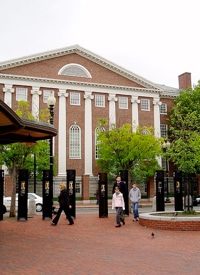
According to an Associated Press report, “Harvard then stopped funding the program in 1995 because of the don’t ask, don’t tell policy, but anonymous donors stepped up.” The return of ROTC to Harvard is directly tied to the lifting by Congress three months ago of don't ask, don't tell.
Currently Harvard students enrolled in ROTC must participate in a program at the nearby Massachusetts Institute of Technology. A statement by the university said that Harvard President Drew Faust and U.S. Navy Secretary Ray Mabus would sign an agreement giving “full and formal recognition” to a Navy ROTC program, with the re-instatement to be complete when the ban on homosexuals is officially repealed later this year.
“Our renewed relationship affirms the vital role that the members of our Armed Forces play in serving the nation and securing our freedoms, while also affirming inclusion and opportunity as powerful American ideals,” Faust declared. “It broadens the pathways for students to participate in an honorable and admirable calling and in so doing advances our commitment to both learning and service.”
Mabus said the renewed relationship “is good for the university, good for the military, and good for the country. Together we have made a decision to enrich the experience open to Harvard’s undergraduates, make the military better, and our nation stronger.”
The White House issued a statement applauding the renewed partnership. “With our nation at war,” said the President’s press secretary Jay Carney, “this sends a powerful message that Americans stand united and that our colleges, society, and armed forces are stronger when we honor the contributions of all our citizens.”
Predictably, all of the Harvard community was not on board with the move, as a small group of students referring to themselves as “transgendered” (meaning they dress and act like individuals of the opposite sex) protested that the military still does not allow individuals of their ilk to serve. “There’s no way ROTC should be on the campus,” said Harvard student Jia Hui Lee, who is a member of a campus “transgender” club called Trans Task Force. “It conflicts with Harvard values, or at least the values it claims to have”—referring to Harvard’s non-discrimination policy.
While Harvard is the first elite university to officially lift the longtime ban on the military training program, other ivy-league schools are exploring their options. At Brown University, President Ruth Simmons appointed a committee to evaluate the possibility of lifting that school’s ban of ROTC. But according to the Associated Press, “a coalition of students and professors opposes a return for various reasons, including concerns about the military, which its website calls a ‘notoriously violent and sexist institution.’” English professor William Keach, a member of the school’s Coalition Against Special Privileges for ROTC, said that because the military’s ban on homosexuals still remains officially in place, it would be premature “to automatically assume that homophobia in the U.S. military has disappeared.”
The AP also reported that “Columbia University leaders have been meeting about ROTC and are expected to vote by the end of the academic year…. Columbia students can participate in ROTC programs at nearby Fordham University and Manhattan College, but a school spokesman said few of them do.”
Even America’s most celebrated Vietnam war protestor, Senator John Kerry (D-Mass.), has asked his alma mater, Yale, to re-instate its long-lost ROTC program, saying that “as an alumnus whose life and values were in part shaped both by Yale, and by my service in the United States Navy, I would like to see Yale join Harvard’s lead in welcoming ROTC back to campus in New Haven.”
In Congress, Senator Joe Lieberman (I-Conn.), the lead sponsor of the “Don’t Ask, Don’t Tell” repeal, applauded Harvard’s decision and encouraged other schools to follow its lead. “Our universities have a major role to play in helping to educate and train our military’s officer corps,” said Lieberman,” adding that “I urge Harvard not to delay implementation of their new policy and other universities that bar ROTC to follow Harvard’s example in bringing this program back to campus. Our precious freedoms are guarded by our men and women in uniform and it is imperative that universities do their part in supporting our military.”
Similarly, Speaker of the House John Boehner (R-Ohio) twittered his praise, saying simply, “I applaud Harvard for allowing ROTC back on campus.”
One military-minded Harvard professor, however, suggested that it might be a little too early for applauding the school. Kit Parker, an engineering professor and Army major who has served three tours in Afghanistan, said that after four decades of snubbing, merely inviting ROTC back to campus is not enough. “We have to sell Harvard to the military,” Parker told the Boston Globe. “There might be some hard feelings in the Department of Defense and frankly, I don’t blame them. We need to put something on the table and say we’re going to make this worth your while, because we can help you build better commissioned officers than other schools.”
Photo: Harvard Square


